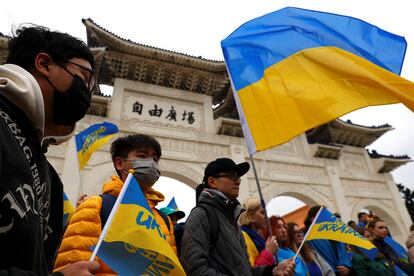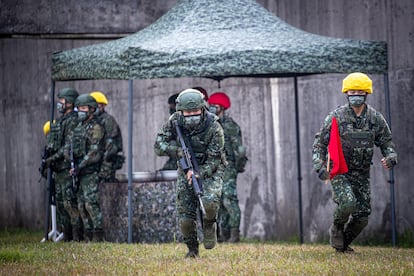Taiwan fears becoming the next Ukraine: ‘We don’t want war, but we must prepare for the worst-case scenario’
The self-governing island, which China considers an inalienable part of its territory, is drawing lessons from the Russian invasion as Washington ups military assistance

At a demonstration, Asian and European faces mingle, blue and yellow flags and masks are everywhere and a stall sells patches with Taiwanese and Ukrainian insignia intertwined. On the one-year anniversary of Russia’s invasion of Ukraine, many people on the self-governing island, which China considers an inalienable part of its territory and which receives military aid from Washington, are drawing parallels between what it is like to live in the shadow of two giants. “We are like two candles in a very dark room!” proclaims Miao Poya, a Taiwanese politician and activist and a councilwoman in Taipei for the Social Democratic Party, who has just taken the stage. “Through our sacrifices we want to illuminate democracy and freedom in the world!”
The demonstration took place on February 25, after 365 days of a war that has revived the notion of large global blocs and which has resonated particularly strongly throughout the East Asia region. “What we need is a little help from our friends,” the politician continues. “Let them give us a little fuel so that we can continue to sacrifice and shine for the whole world.”
The gathering was held in Taipei’s Freedom Square, under a huge oriental-style gate from which the memorial hall of the dictator Chiang Kai-shek is visible. Chiang was the leader of the Nationalist faction that took refuge in Taiwan in 1949 after being defeated by Mao Zedong’s communists in the Chinese Civil War. The vanquished side founded their own government on the island, which they named the Republic of China.
Today, Taiwan is a democracy of 23 million people, with its own currency and armed forces, but without recognition as a sovereign state by the vast majority of the international community. This unresolved legacy has also made it one of the most volatile spots on the planet and the tangible expression of the ongoing struggle between the two global superpowers: the slightest spark could light a touchpaper under decades of diplomatic balancing acts and ambiguities between Washington - which has never officially defined whether or not it would defend the island militarily in case of conflict - and Beijing, which seeks a peaceful reunification but refuses to rule out the use of force as a “last resort” in its goal to incorporate the territory.
This turbulent triangular relationship flared up last summer when then-US House speaker Nancy Pelosi visited Taiwan. The trip infuriated the Chinese government, which responded by staging military exercises around the island on an unprecedented scale, including the launch of a barrage of missiles. Pelosi’s successor, Kevin McCarthy, has agreed to meet with Taiwan’s President Tsai Ing-wen in California instead of Taipei to appease the anger of the Chinese authorities, according to the Financial Times.
Tension across the Taiwan Strait has been entrenched for more than seven decades, but Russia’s invasion of Ukraine has raised fears among some Taiwanese: full-scale wars are no longer a thing of the past. A survey conducted last October asked respondents if they agree with the following statement: “The most important lesson the war in Ukraine has for national defense education is that you must fight to save your own country:” 83.3% said yes.

“I think war with China is coming,” says Private Lee at the rally. “It will be in maybe two or three years.” The 35-year-old came to the rally dressed in military fatigues. He served four years in Taiwan’s army and is now a reservist who, by his own account, has spent nearly eight months on the Ukrainian front lines as a drone pilot attached to an infantry company in Kharkiv. He plans to return. A handful of Taiwanese have made the same trip to help the Ukrainian cause while gaining battlefield experience. One of them was killed in November.
With Lee at the rally are two other volunteers. One of them, Lu Tzu Hao, 34, shows a photograph from the front lines with a missile launcher on his shoulder. Conflict with China, Lu says, is “likely” because Xi Jinping “thinks it is easy to take Taiwan, like Putin.” But Ukraine, he adds, has given Taiwan a boost: “We are weak, but we can beat a strong country with the support of the rest of the world.”
Following the row over Pelosi’s visit, Washington has approved $10 billion in military assistance to Taipei and recently decided to increase the number of US military advisors on the island, according to The Wall Street Journal. Taiwan, meanwhile, has increased compulsory military service from four months to one year and is also considering increasing the number of troops sent to the United States to train alongside American soldiers.
From the other side of the strait, Beijing is monitoring developments with concern. The Chinese government has accused Washington of trying to alter the status quo in the region, of supporting separatist forces and of contravening the “One China policy,” whereby Washington recognizes Beijing as the legitimate government of the country and does not maintain official diplomatic ties with Taiwan. Mao Ning, spokesperson for the Chinese Ministry of Foreign Affairs, has accused Washington of promoting the idea of “Ukraine today, Taiwan tomorrow,” and warned of “serious consequences” of continuing down the same path.
“We both face powerful and aggressive neighbors with territorial ambitions,” says Peifen Hsieh, director of International Affairs for the Democratic Progressive Party, which has ruled Taiwan since 2016. Peifen has just delivered a speech and says lessons can be drawn from the war in Ukraine: “We don’t want war, but we must prepare for the worst-case scenario. We will not bow to the abuse of an authoritarian regime.”
Also speaking at the rally is Yurii Poita, a Ukrainian analyst and expert on China and its influence in the post-Soviet space who holds a position at The Institute for National Defense and Security Research think tank in Taipei.
Poita, who is also a member of the Berlin-based MERICS Institute for China Studies and the Kyiv-based Center for Army, Conversion and Disarmament Studies, says he has held meetings with Taiwanese military commanders, who are interested in the asymmetrical defense system that Ukraine has put together and in Western-supplied anti-aircraft missiles and anti-tank weapons, which have helped to turn the tide of the conflict. Poita adds that they are also intrigued by how to leverage the most unpredictable factor: “Taiwan is interested in how to raise and maintain the morale of the armed forces, one of Ukraine’s advantages,” he says. “They want to understand why Ukraine’s armed forces don’t give up, why they fight so fiercely on the battlefield.”
Sign up for our weekly newsletter to get more English-language news coverage from EL PAÍS USA Edition
Tu suscripción se está usando en otro dispositivo
¿Quieres añadir otro usuario a tu suscripción?
Si continúas leyendo en este dispositivo, no se podrá leer en el otro.
FlechaTu suscripción se está usando en otro dispositivo y solo puedes acceder a EL PAÍS desde un dispositivo a la vez.
Si quieres compartir tu cuenta, cambia tu suscripción a la modalidad Premium, así podrás añadir otro usuario. Cada uno accederá con su propia cuenta de email, lo que os permitirá personalizar vuestra experiencia en EL PAÍS.
¿Tienes una suscripción de empresa? Accede aquí para contratar más cuentas.
En el caso de no saber quién está usando tu cuenta, te recomendamos cambiar tu contraseña aquí.
Si decides continuar compartiendo tu cuenta, este mensaje se mostrará en tu dispositivo y en el de la otra persona que está usando tu cuenta de forma indefinida, afectando a tu experiencia de lectura. Puedes consultar aquí los términos y condiciones de la suscripción digital.









































